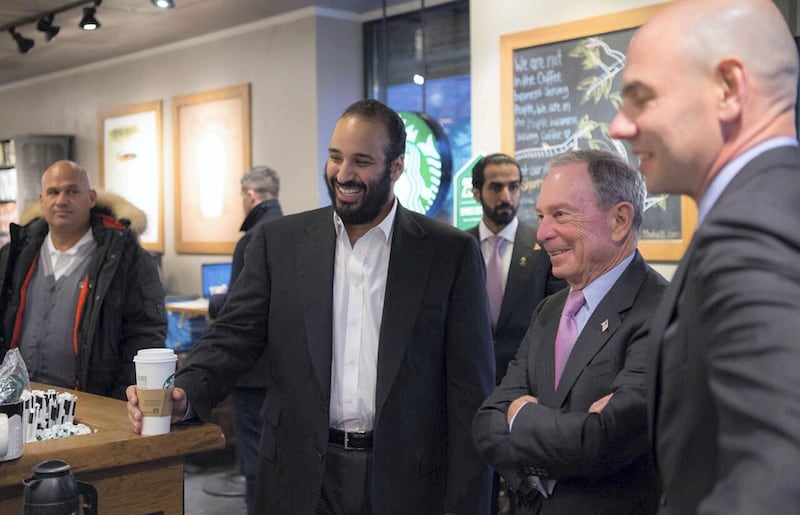Saudi Crown Prince Mohammed bin Salman leaves New York on Friday after week-long visit that took Riyadh "out of its comfort zone" with corporate, bipartisan and inter-religious meetings, and saw the signing of ambitious stock and energy agreements.
Prince Mohammed heads next to Seattle, San Francisco and Los Angeles, where he is expected to break precedent in meetings with the entertainment industry, including Ari Emanuel, the co-chief executive of William Morris Endeavor, and possibly Oprah Winfrey. While some reports suggested that the crown prince would meet Barack Obama, the former former US president was on a trip to Asia before he was spotted in Oahu, Hawaii on Tuesday.
In New York, Prince Mohammed met former secretaries of state John Kerry and Henry Kissinger, and the UN Secretary General Antonio Guterres. He also reportedly met former president Bill Clinton and former presidential candidate Hillary Clinton. On Thursday he held talks with representatives of the UN Security Council's five permanent members and Germany, all parties to the 2015 nuclear deal with Iran.
On the corporate and financial side, the Saudi crown prince held talks with more than 50 executives and investors, as well as media mogul Rupert Murdoch and former New York mayor Mike Bloomberg.
Brian Katulis, a senior fellow at the Centre for American Progress, said the meetings with key Democrats was a "sign that the Saudi leadership realises that they are perceived to have been too close to Donald Trump and [his son-in-law] Jared Kushner and they need to maintain open dialogue with the full political spectrum in US".
Prince Mohammed is showing a "pragmatic understanding that the US is an open democracy" and is attempting "to address Saudi's own political vulnerabilities with Democrats on issues related to the war in Yemen and the nuclear deal with Iran", Mr Katulis told The National.
On the perception of Saudi Arabia, Mr Katulis said the crown prince's meetings "in their own small way are making a difference", especially on the association of the kingdom with conservative Islam. In an interview with the Washington Post, Prince Mohammed decried attempts to hijack Islam. In New York, he met a group of inter-religious leaders that included the Most Reverend Bernardito Cleopas Auza, permanent observer of the Holy See to the United Nations; Bishop James Massa, Auxiliary Bishop of the Diocese of Brooklyn; Rabbi Steven Wernick, chief executive of the United Synagogue of Conservative Judaism; Rabbi Richard Jacobs, president of the Union for Reform Judaism; and Allen Fagin, executive vice president of the Orthodox Union.
"He is stepping out of the usual comfort zone [for Saudi Arabia], especially if you compare to previous Saudi visits that were confined to the political and military-industrial side of Washington," said Mr Katulis.
The crown prince was seen in a business suit grabbing a coffee with Mr Bloomberg in downtown Manhattan.
_______________
Read more:
FTSE upgrades Saudi Arabia to emerging market status
Saudi Arabia and SoftBank sign $200bn deal for 'world's largest solar project
Saudi Crown Prince meets UN Secretary General Antonio Guterres in New York - in pictures
_______________
On the economic side, news that Saudi Arabia's stock market will join FTSE Russell's emerging market index next year and a memorandum of understanding with SoftBank Group to build a $200 billion solar power project were two major headlines from the trip.
Karen Young, a senior resident scholar at the Arab Gulf States Institute in Washington, said the FTSE inclusion was a "welcome change from Frontier to Emerging Market status for the Kingdom, which will attract passive investors in funds around the world to buy into Saudi companies".
"The challenge now is for Saudi Arabia to include more companies in its stock exchange, which increases the pressure on the government to allow the private sector to flourish and compete with state entities, and for private investors (and foreign investors) to be allowed to create and buy new businesses in the country," Ms Young told The National.
On the solar power agreement, she said: “There will be lot of opportunity in power development and Saudi Arabia needs to use renewable sources, and alternative finance sources.”
Ms Young noted the ambitious goal of 200 gigawatts, which exceeds Saudi Arabia’s needs “even with growing demand past 2030".
“The idea is that Saudi Arabia would be a mass electricity exporter to the region, perhaps to the Red Sea/Egypt and beyond. But that is a very big if”, she said.
On his next stop in Seattle, Prince Mohammed will meet Microsoft executives and its principal founder, Bill Gates.






